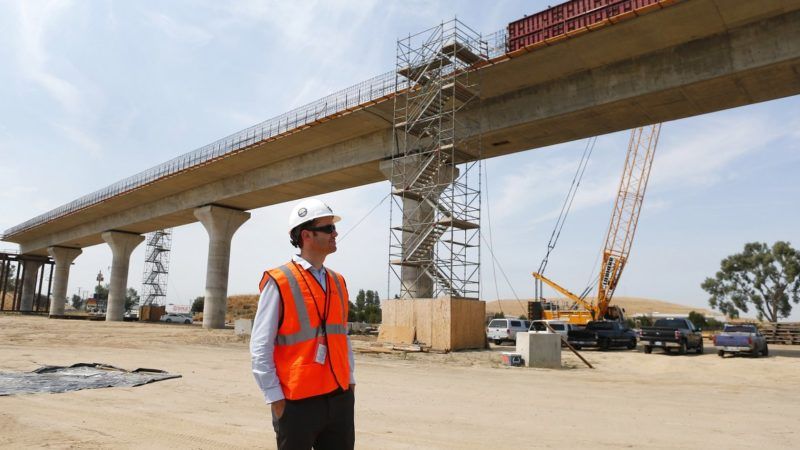Will President-Elect Joe Biden Make All of America Pay for California's Bullet Train?
A struggling, costly boondoggle sees a much friendlier administration taking charge.

Joe Biden's election as president may be just what California's financially strapped money pit of a high-speed rail plan needs to keep going, regardless of whether or not it's a sound idea (it's not).
Biden wants to spend $11 trillion on an assortment of policies. He is noted for his love of trains and, during the Democratic primary debates, promoted a national network of high-speed rail, which he said would get millions of cars off the road. That's likely not true: in the event that America did have a national high-speed train network, it would probably draw customers mostly away from airlines, not personal cars.
Regardless, Biden made high-speed rail part of his campaign platform. However, there's an interesting omission in the transit plans listed on his transition site. Here's what he's promising to do:
Provide every American city with 100,000 or more residents with high-quality, zero-emissions public transportation options through flexible federal investments with strong labor protections that create good, union jobs and meet the needs of these cities—ranging from light rail networks to improving existing transit and bus lines to installing infrastructure for pedestrians and bicyclists.
Nothing there about high-speed rail or expansion of train systems beyond cities. But maybe it's in his national infrastructure section? Nope. Here's what that says:
Create millions of good, union jobs rebuilding America's crumbling infrastructure—from roads and bridges to green spaces and water systems to electricity grids and universal broadband—to lay a new foundation for sustainable growth, compete in the global economy, withstand the impacts of climate change, and improve public health, including access to clean air and clean water.
Again, no national bullet train. Surprisingly, given Biden's adoration of them, there's no reference to trains at all.
Don't read too much into it. Biden has selected teams to review all federal agencies for his transition into office. To head the team analyzing the Department of Transportation (and Amtrak), he chose the CEO of Los Angeles County's transit agency, Phil Washington. Washington is big on light rail, working on expansions for it in Los Angeles and in his previous work heading Denver's transit program. Therese McMillan, executive director of the Bay Area's Metropolitan Transportation Commission, is also on the team, along with several union representatives. Notably, there is nobody from Lyft, Uber, or any other company that provides market-based solutions to transit needs.
California's high-speed rail does not immediately appear to be a top priority for Biden, nor should it be. The finances of California's high-speed rail project are simply not in a good place right now. First of all, the project itself is a massive money pit, and costs have skyrocketed far beyond what taxpayers agreed to when they approved Proposition 1A in 2008. That proposition allocated $9 billion to start the project, which voters were told would ultimately cost $33 billion. The rail project is now estimated to cost more than $80 billion to complete. It also won't be as fast as promised and will likely need continued government subsidies to actually operate.
Second, the skyrocketing costs have collided with the terrible fiscal impacts of the coronavirus. California is now facing massive deficits due to declines in tax revenue due to the pandemic and lower-than-projected revenues from cap-and-trade greenhouse gas auctions, a portion of which are devoted to the train line's construction.
Probably the most important concern from California's rail project right now is that the Department of Transportation under President Donald Trump has frozen a federal grant of more than $900 million promised under President Barack Obama. The Trump administration justified freezing the funds by citing the rail project's inability to meet its schedule and claiming that the California High-Speed Rail Authority (CHSRA) has misused the money it already received.
So, will the Biden administration reverse course and possibly come up with more money for California's rail system? The transition team's press office declined to respond to emailed questions from Reason asking about possible high-speed rail funding plans. CHRSA Chief Executive Officer Brian Kelly responded with a simple statement, saying, "We hope to establish a functional and cooperative relationship with our federal partner on this project. We are encouraged by the opportunity to do so."

Show Comments (111)